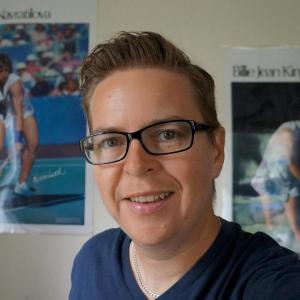
About
Kristi Tredway is a Research Associate in the Breast Cancer Program in the Sidney Kimmel Comprehensive Cancer Center at Johns Hopkins University, researching breast cancer disparities across race, sexual orientation, gender expression, and other social factors.
Grounded in intersectionality and focused on cancer diagnosis and treatment, Kristi’s research rests at the confluence of British cultural studies (where history, sociology, and anthropology intersect), social medicine, health disparities of marginalized populations, and bioethics. She focuses on the body from a cultural perspective, maintaining particular attention to how sex, race, gender expression, and sexuality inscribe cultural meanings on our bodies. The broader goal of her research is to highlight inequitable cultural understandings of the body and to work collaboratively with colleagues to redress them.
As if from a John Steinbeck novel, Kristi’s family are working-class American Indians who moved from Oklahoma to the Central Valley of California during the “Dust Bowl,” arriving in Escalon in 1937. Her ancestors before them walked “The Trail of Tears,” which was the forced removal of American Indians in the Southeast in 1830 to what would become Oklahoma. Kristi’s grandfather worked his way up in California wineries and, in the 1970s, became the president of the Winery Workers Union, one of the largest unions in the state. Her immediate family still calls Escalon, California, home. Outside of American Indian contexts, Kristi doesn’t look American Indian; however, though she appears white – so she has particular insights into the politics of passing – most of her social interaction style can be traced directly to American Indians, including quiet contemplativeness, humor, and a focus on building and strengthening her communities.
Kristi started kindergarten in 1975, the year Title IX, the federal legislation which banned inequality in schools based on gender, was fully implemented in California, the first state to do so. Title IX has had the largest impact on women’s sports of any legislation in the U.S. This legislation gave her full access to sports and is the catalyst for her developing into a professional tennis player in 1988. This was Kristi’s occupation for almost five years, ending only when she severely damaged the cartilage in her knee. After her injury, it was Rosie Casals (now an International Tennis Hall of Fame inductee), her coach, who told her to go to college until she discovered what she wanted to do next, which led her to become the first person in her family to attend college when she enrolled at Modesto Junior College, her local junior college. Being a professional tennis player moved Kristi from the working class to the middle class. Being in the middle class made college seem like a viable option after her playing career was over. This intersection of the experience of class plays a significant role in her analyses since tennis has provided her with an enormous amount of cultural capital that she would not have had otherwise.
At the time of her retirement from competitive tennis, Kristi was the most highly ranked American Indian in the history of tennis, and continues to be.
Athletic participation is a battleground for women’s rights where women have exerted their physical agency against many odds, and Kristi has published widely in this area, including her socio-historical book, Social Activism in Women’s Tennis: Generations of Politics and Cultural Change (2020, Routledge). Her interdisciplinary research approach utilizing intersectionality, British Cultural Studies, and performativity to understand the effects of social categories and power on women’s embodiment. This approach is strengthened by qualitative ethnographic methods.
From the view of the ever-increasing medicalization of women’s athletic bodies, Kristi transitioned to a different angle to the same question in trying to understand how sexual and gender minorities (SGM) view medical settings so that she can work at improving healthcare access for these populations. Kristi’s own experience existing at multiple intersections of marginalized groups in our society – sex, gender, race, class, sexuality, cancer survivor – draws her to intersectionality and using it to analyze particular cultural locations (such as tennis or medical settings) to learn how these sites communicate values about which bodies are seen and supported in these spaces with an effort to improve the inclusivity within them.
Education
Kristi earned her BA in women studies and philosophy from the University of Colorado working closely with Alison Jaggar, the highly esteemed feminist philosopher and ethicist. She stayed at Colorado for her MA, which she earned in religious studies, specifically American Indian philosophy and culture, working with Vine Deloria, Jr., the pre-eminent authority on American Indian culture and politics. She was able to accomplish this only two generations from her grandfather being reprimanded for speaking Choctaw at school. Kristi earned her PhD in physical cultural studies from the School of Public Health at the University of Maryland in May 2016, working closely with Patricia Hill Collins, the world famous theorist of intersectionality, from the Department of Sociology.
Areas of Expertise
- Intersectionality
- Cultural understandings of the body
- Lesbian, gay, bisexual, transgender, and queer (LGBTQ) cultures and politics
- Preventive cancer screenings and access to health for marginalized populations
- Women’s sports
- Qualitative methods
- Archival research
Current Position
Kristi is a Research Associate in the Department of Oncology in the School of Medicine at Johns Hopkins University. As a faculty member, she is based in the Under Armour Breast Health Innovation Center in the Skip Viragh Outpatient Cancer Center. Kristi was also selected for the President’s Diversity Leadership Council at Johns Hopkins University in 2019 and continues to serve in this capacity.
Professional Affiliations
- American Association for Cancer Research
- American Association for the History of Medicine
- American Society of Clinical Oncology
- American Sociological Association
- Sub-memberships: medical sociology
- National LGBT Cancer Network